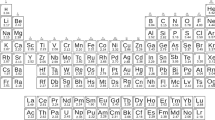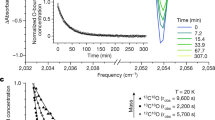Abstract
HIGMAN1 recently suggested a new mechanism for the Beckmann rearrangement which postulates that the cation (I) rearranges by rotation of the central > C = N < unit through 90° to form (II). This suggestion, though ingenious, is not in accordance with the known facts.
This is a preview of subscription content, access via your institution
Access options
Subscribe to this journal
Receive 51 print issues and online access
$199.00 per year
only $3.90 per issue
Buy this article
- Purchase on Springer Link
- Instant access to full article PDF
Prices may be subject to local taxes which are calculated during checkout
Similar content being viewed by others
References
Nature, 156, 242 (1945).
Kuhara and Todo, Mem. Coll. Sci. Kyoto Imp. Univ., 2, 387 (1910).
Chapman and Howis, J. Chem. Soc., 806 (1933). Chapman, ibid., 1550 (1934). Chapman and Fidler, ibid., 448 (1936).
Brodski&icaron; and Miklukhin, C.R. Acad. Sci. U.S.S.R., 32, 558 (1941); J. Chem. Phys., 11, 342 (1943).
Brynmor Jones, Chem. Rev., 35, 335 (1944).
Author information
Authors and Affiliations
Rights and permissions
About this article
Cite this article
DEWAR, M. Mechanism of the Beckmann Rearrangement. Nature 156, 688–689 (1945). https://doi.org/10.1038/156688b0
Issue Date:
DOI: https://doi.org/10.1038/156688b0
This article is cited by
-
Oxidation and Reduction in Chemistry
Nature (1946)
-
Mechanism of the Beckmann Rearrangement
Nature (1946)
-
Kinetics of Aromatic Nitration : the Nitronium Ion
Nature (1946)
Comments
By submitting a comment you agree to abide by our Terms and Community Guidelines. If you find something abusive or that does not comply with our terms or guidelines please flag it as inappropriate.



